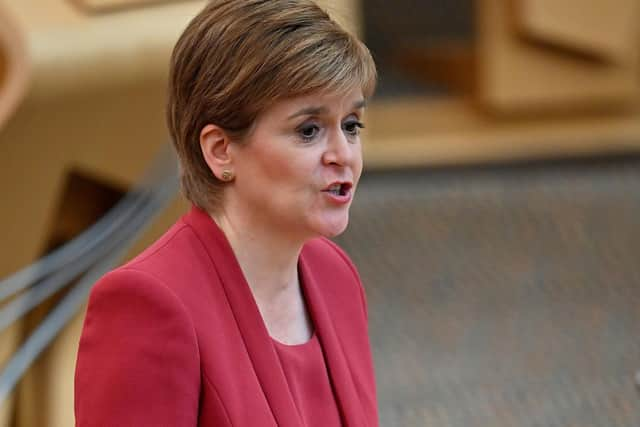FMQs: Nicola Sturgeon defends SQA and controversial appeals process
Ms Sturgeon came under fire at First Minister’s Questions over the row around the Alternative Certification Model put in place after formal exams were scrapped, and the appeals process unveiled by her new education secretary yesterday, which warned pupils they could be downgraded if they were unhappy with their results.
Many pupils, parents and teachers have raised concerns about the assessments, described as exams by another name, after a year of disrupted education as a result of Covid lockdowns.
Advertisement
Hide AdAdvertisement
Hide AdThere was more anger yesterday about the appeals system, which was announced by Shirley-Anne Somerville after weeks of delay by the SQA with young people’s representatives on the body set up to design the process revealing they had not been involved and did not approve it.


Scottish Conservative leader Douglas Ross – asking questions virtually as he is self-isolating – challenged Ms Sturgeon on whether she supported the SQA, as many opposition parties have urged its total reform.
"Yes I do,” she said. “I and the government recognise that this is a really anxious time for pupils and parents so it’s important we and the SQA continue to listen and ensure fair grades are delivered under difficult circumstances.”
Ms Sturgeon said she would “stay away from partisan politics” and said similar arrangements were being put in place and England and Wales where the ruling parties were of a different political hue.
Quoting Jim Thewliss, the General Secretary of School Leaders Scotland who has said “the system that replaced exams was never going to be perfect but no-one has come up with a better way of doing it”, Ms Sturgeon added: “The government is continuing to do all it can to support pupils.”
Mr Ross said tens of thousands of pupils and parents already felt “badly let down” by the SQA last year, and now more were facing “a year of grades chaos and confusion”.
He quoted Leon Cameron of Glasgow Youth Council who had said “we are extremely angry with people in authority, the Scottish Government and SQA, who keep saying everything is okay when it’s not. They are clearly in denial. We have been put through hell.”
Ms Sturgeon said she did not agree with Mr Cameron, but that it was her “duty to persuade young people and parents across the country” of the fairness of the system.
Advertisement
Hide AdAdvertisement
Hide Ad"While no government can take away all the impacts of the global pandemic on our young people... this government is doing everything we can in a highly challenging set of circumstances to deliver fairness for pupils and that work will continue.
"The ACM was developed by the National Qualifications group that brought together teachers representatives, parents and pupils. The EIS says this gives pupils the best opportunity to demonstrate what they have learned.
"the SQA has put in place an appeals process which gives everty young person a direct right of appeal, free of charge. There have been difficult decisions to take around a detriment appeals system or a symmetrical appeals system and the SQA has gone for the symmetrical system which is the same as in England and Wales.
"There’s also a concern being raised and we're listening carefully, about specific grounds for appeal, and no ground of appeal that takes account of exceptional personal circumstances. The reason for that is we don't think a young person who has suffered exceptional circumstances should have to rely on an appeal. If someone suffers a bereavement that means they can’t put forward an assessment by the date in June, they have a window of time in which to enter.
“The grades are based on teacher judgement, informed by the work of pupils.”
Mr Ross said that last year it took a week for the government to u-turn on the exam results and “this year’s children shouldn’t have to go through the same thing again.”
On the threat of downgrading results on appeal, he added: “The Scottish Children and Young People’s Commissioner has said ‘it’s an unnecessary and disempowering barrier to young people’. That’s a concern echoed in homes and classrooms. Is she seriously defending an appeals system that risks pupils receiving lower grades and demands they gamble on their future?”
Again, the First Minister said the same approach was being taken in England, and the symmetrical system would “ensure the attainment of pupils is central, that’s the fairest way and is the approach taken place in past years.”
Advertisement
Hide AdAdvertisement
Hide AdShe added: "The downgrading of grades is exceptionally rare. In 2019 out of over 11,000 appeals only two were downgraded. In 2018 from 13,000 appeals, seven were downgraded, it’s an exceptional occurrence.
“And the appeals system should be used in exceptional circumstances, not because we want to put people off, but because we want to get grades right first time which is why the judgement of teachers is central to this.”
However Mr Ross said “pupils were dismayed, teachers ignored and parents furious” and asked Ms Sturgeon to “concede she’s got this badly wrong and guarantee that no pupils who appeal will be downgraded – because it is a risk – and will she start to fix the deeper problems in education, beginning by replacing the SQA?”
For the third time Ms Sturgeon pointed to similar arrangements taking place in England and Wales and said parliament would debate the issues around the future of education.
"But we will continue to listen and address concerns as far as we can,” she said.
A message from the Editor:Thank you for reading this article. We're more reliant on your support than ever as the shift in consumer habits brought about by Coronavirus impacts our advertisers.
If you haven't already, please consider supporting our trusted, fact-checked journalism by taking out a digital subscription.
Comments
Want to join the conversation? Please or to comment on this article.
